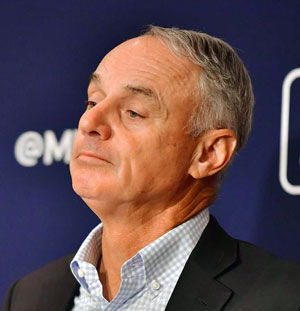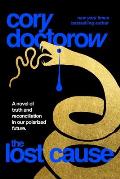Another rant about Rob Manfred

Hey Rob, you're bad at your job and nobody likes you.
We're getting close to baseball season 2023. Which is, for some of us, all kinds of fun and cool. However, because we live in the Rob Manfred Era of Major League Baseball, it also means we need to prepare for what is now an annual period of adjustment to the new ways Commissioner Manfred has decided to screw with the game and piss us all off.
I've written plenty about Rob Manfred's penchant for damaging the game of baseball over at that-other-site-I-used-to-run-that-is-now-defunct-and-one-day-I-will-put-selected-posts-up-here-as-a-form-of-archiving. He is without a doubt the worst person to ever occupy the office of Commissioner of Baseball. He doesn't appear to even like baseball. He's all about incessantly tweaking anything he can think of if there's the slightest possibility it might mean more money for team owners in the short term. (Fuck the long term. Compared to Manfred, even Mr. Magoo has telescopic HD x-ray vision.)
Ever since Manfred took over the job, he's been altering the game in both large and small ways. To date it hasn't gone so far as to make the game unrecognizable, but give the guy a few more years and we'll be watching blernsball or Calvinball.
A lot of the alterations are "behind the scenes," dealing with money stuff and organizational rules about how long a stint on the injured list is, how the amateur draft is conducted, how many times a player can be shuttled back and forth to the minor leagues, that sort of thing, and those might be good or bad but they don't actually affect the game as it's played on the field from first pitch to last out. It's the on-field stuff that grates my cheese the most.
2023's new rules include:
- A pitch clock
- Bigger bases (18" square rather than the traditional 15")
- Restrictions on where defenders may position themselves
- Severely limiting what a pitcher may do to hold a runner close to a base
This, of course, is on top of other rules that were implemented since 2019, which include:
- The automatic intentional walk
- Three-batter minimum for pitchers
- A limit on how often catchers can go to the pitcher's mound
- Proscriptions on what players may and may not pitch and when
- The "zombie runner" in extra innings, which was supposed to be a temporary COVID-era measure that has, as of last Monday, been made "permanent."
- The metastasization of the cancer known as the designated hitter rule
- Diluting the season with added Wild Card teams in the playoffs
The only new rules I don't detest are the mound-visit limit and the three-batter minimum. Those actually add an element of strategy while addressing Manfred's complaint, which was so-called "dead time" while pitcher and catcher discussed tactics and too many pitching changes. Otherwise, these changes all completely suck. I could go into why for each of them, but I'll spare you that for now.
Manfred's stated goal with all these tweaks and changes is to "increase the pace of play," by which I think he really means "make the game more accessible for those with attention-deficit disorder." (Come to think of it, Manfred himself may well have ADHD, which would explain some of this nuttery.) His actual goals are open to speculation, but you would not be out of line to think dumbing things down is high on the list.
Unquestionably the experience of the game has slowed, for lack of a more accurate shorthand, over the past couple of decades. Relief pitching has become far, far more prevalent and that brought along the "dead time" of more pitching changes during games; existing rules regulating batters stepping out of the batter's box were not enforced and more and more players developed Nomar Garciaparra-like habits; the steroid-era created so much more emphasis on home-run power that more and more and more players adopted approaches to hitting that made "This misnomer of a phrase refers to a plate appearance resulting in a strikeout, a walk, or a home run. A “three-true-outcome hitter” is statistically unlikely to do anything else in any given time at bat.three-true-outcome" players common rather than rare; certain matchups like Yankees-Red Sox came to have so many mound meetings that if you worked it right you could time a trip to the concession stand during one and not miss a pitch. And, of course, TV demanded more commercial time, about which there's only so much anyone would be willing to change.
Imposing some sort of "correction" on the game to address this slowing isn't in and of itself something I would oppose categorically. On the contrary, I would very much like to see the obsession with home runs fade away and contact-hitting return to favor. That would reduce the number of pitches per at-bat, reduce the incentive for defenses to employ position shifts, even cut down on relief usage by allowing starting pitchers to go deeper into games before tiring. But you don't accomplish that by imposing a pitch clock; or, if you do, it's a side effect rather than the plan.
The pitch clock might work out OK in the end, but it sure seems problematic. It's pretty brief—not so much for the pitcher as for the batter; pitchers will have 15 seconds to start their throwing motion (20 if there are runners aboard), batters must be in their stance and “alert to the pitcher” within eight seconds. The problems come in when the time is exceeded and a ball or strike is added to the count to penalize whichever player wasn't ready in time. Imagine that happening during a tense moment in the late innings of a tight game. One effect might be that pitchers don't throw as hard, which would be welcome. Another might be that pitchers get hurt more often, which would not.
Larger bases...eh, they look weird, but this will quickly become "normal" and not be much of a thing. It's just a way to increase offense, get more safe calls, but it might make for fewer collisions and injuries to first basemen. I can live with it.
The restriction on pick-off attempts is the worst of these new changes, it's a naked tipping of the scale away from the defense in favor of baserunners. It'll turn every pitcher into Jon Lester, except he won't even be able to step off the pitching rubber or hold before the pitch to keep a runner close to the base. It's a much more significant change to the game than I think anyone realizes at this point. Don't get me wrong, I love stolen bases—my favorite team of all time is the 1985 Cardinals, after all—but don't cheapen them. Cat-and-mouse between a pitcher and a Lou Brock or a Vince Coleman on first was part of the tension, part of the thrill of getting a steal. Now it's gone.
Manfred has done away with the pitcher-runner tension, eliminated all strategy related to pitchers batting and worsened the existing DH rule to favor Shohei Ohtani alone while enacting rules that make future Ohtani-like "two-way" players nearly impossible, imposed radical restrictions on who can play where and in what circumstance, destroyed the potential for epic extra-inning games, cheapened the meaning of the long season schedule with almost participation-trophy tiers of playoffs, and that doesn't even get into his penchant for negotiating in bad faith, his pathetic response to cheating teams, his dishonest remarks to the press, basic stupidity about the game, and utter disregard for fans and consumers of the sport—his ostensible constituency as commissioner of baseball.
Or is it even ostensible? The fact of the matter is that ever since Bud Selig, then the owner of the Milwaukee Brewers (and thief of the Seattle Pilots), succeeded in his coup d'etat to overthrow Commissioner Fay Vincent to install himself in the position in 1992, there has been no figure in the MLB hierarchy that represents the baseball consumer. Selig made the job into a mouthpiece for ownership, an autocratic office firmly entrenched with championing the interests of club owners and club owners only. Calling the position "Commissioner of Baseball" is improper. Needs a new title, like "Agent of Greedy Asshats." I mean, there isn't a "commission" anymore. There aren't even league presidents to mediate.
The Commissioner position was created (well, technically reformed, but for all practical purposes created) in the wake of the Black Sox scandal and ensuing threats by National League officials to effectively destroy the American League by absorbing big-city AL teams into its own circuit. To contend with the public relations nightmare, an outsider was brought in to safeguard the national pastime as chair of the reimagined National Baseball Commission, which was to be made up of, by design and specific intent, people not otherwise affiliated with the business of professional baseball. That chairperson was Kennesaw Mountain Landis, who insisted on being a commission of one and, as he knew the lords of the Majors needed him more than the other way around, negotiated himself ultimate authority as the commissioner to act "in the best interests of baseball" as a whole, not of club owners or ballplayers or media figures or any other isolated group. Essentially, to represent the consumers, the public, as well as mediate disputes, regulate conflict, and be a check on ownership (players of the time didn't have any power to check). Subsequent commissioners had the same authority, purview, and requirement to be otherwise unaffiliated with the business of the leagues. Until Bud Selig's coup, which almost immediately begat the 1994-95 strike. (The revisionist history of Selig's reign reminds me a lot of how people talk about George W. Bush—"he kept us safe." You know, except for that one time. "Selig presided over great growth of the game," you know, except for that one time.)
Manfred claims to have the fans' interests at heart. “I think that the concern about our fans is at the very top of our consideration list,” he actually said with a straight face during the last collective bargaining sessions with the players' union, after which he imposed a lockout and canceled the beginning of the 2022 season.
Baseball doesn't have a commissioner, it has an agent of greed, and in this case one that doesn't like the sport and wants to make it something else.
Alas.
I'm trying to keep an open mind on the pitch clock. But I suspect the law of unintended consequences will rear its ugly head and it'll be bad.



Comments
No comments yet.
Add your comment
RSS feed for comments on this page
RSS feed for all comments